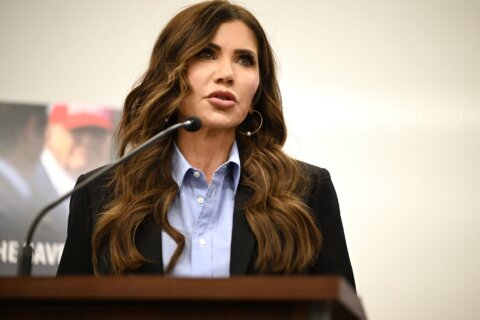WASHINGTON — With the White House and Congress digging in on differences over funding for a border wall, there’s growing anxiety among D.C.-area lawmakers and federal workers that a partial government shutdown could begin this weekend.
Part of the federal government will shut down Friday at midnight unless an agreement on a new spending plan is reached. Democratic staff for the Senate Appropriations Committee have estimated the shutdown would affect more than 800,000 federal workers, including at least 420,000 who would be working without pay.
“Look, it’s demoralizing. It really is,” said Rep. Anthony Brown, a Democrat who represents more than 50,000 federal workers in Maryland’s 4th District, which includes parts of Prince George’s and Anne Arundel counties.
The shutdown would go into effect just days before Christmas. Brown said he understands the nervousness of those who rely on a federal paycheck.
“Given the timing of this, it creates a considerable amount of anxiety for families, particularly those who work for the federal government,” Brown said in an interview with WTOP.
More than 280,000 federal workers are employed in D.C. and the Maryland and Virginia suburbs. Brown and others point out that the workers also have a broader impact on the region’s economy.
Shutdown would impact major federal agencies
About 75 percent of the federal government has been funded by Congress. But appropriations have not been completed for several agencies, including the following departments: Agriculture, Commerce, Housing and Urban Development, Interior, Justice, and Transportation.
Also incomplete is funding for the Department of Homeland Security, which includes the most-sensitive issue related to the budget impasse: a border wall. President Trump wants $5 billion for a border wall, while Democrats say they will spend no more than $1.6 billion for border security.
The president indicated little desire to compromise on border wall funding in a tweet on Monday.
Democrats have suggested a continuing resolution for DHS, essentially delaying a showdown over border wall funding until next year. But the White House and some Republicans are wary of that approach, because Democrats will take control of the House of Representatives in January. The approach of a possible shutdown has again raised questions about what services will be affected.
Will a shutdown affect airports and holiday travel?
Transportation Security Administration workers are considered essential and would continue to work at the nation’s airports during a shutdown. There are more than 50,000 TSA employees nationwide. More than 50,000 Customs and Border Protection agents and customs workers would also continue to work.
What would happen to national parks?
More than 80 percent of the National Park Service would be furloughed. While most parks are expected to remain open, they wouldn’t be operating as they normally would. Visitors centers at parks would likely be closed, and there wouldn’t be staff members to provide their usual assistance.
Would a shutdown affect the U.S. Postal Service and deliveries?
No. The Postal Service is considered an independent agency and is not part of this budget standoff.
What’s next?
While Democrats and Republicans in Congress have both indicated they have little appetite for a government shutdown, there were no major signs on Monday of any progress. Members of the House don’t return into session until Wednesday evening, so it’s not likely any major developments will take place until later in the week.
Local lawmakers are sharply critical of the situation and say federal workers shouldn’t be left in limbo, as they have so many times in the past. Rep. Steny Hoyer — the House minority whip who also represents Maryland’s 5th District — said before the House recessed last week that a government shutdown would be “stupid.”
His Republican counterpart, Rep. Kevin McCarthy, who represents California’s 23rd District, agreed on the House floor that a shutdown should be avoided. But he also chided Democrats, saying they caused the most recent shutdown earlier this year.
For his part, Brown said his constituents in Maryland should not be “puppets” in a political drama.
“These are people, men and women, who choose to work for the federal government because they believe in the work,” he said.







